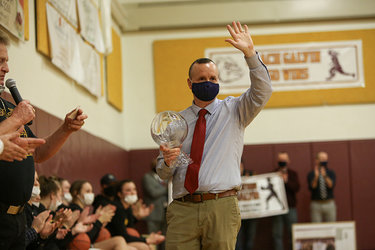BKW’s Coach Galvin helps teenage girls with the hardest job in the world
BERNE — Berne-Knox-Westerlo’s athletic director and dean of students, Tom Galvin, is being inducted into the New York State Basketball Hall of Fame, run by the Basketball Coaches’ Association of New York, for his achievements as the girls’ varsity basketball coach.
Galvin told The Enterprise this week that he was “definitely surprised” by the announcement.
“Sometimes, as a small-school girls’ coach you just kind of do what you do in the background, and you’re not sure if anybody notices,” he said.
Superintendent Bonnie Kane told the board of education last month that Galvin, 52, has led the team to 444 victories, and a release from the hall-of-fame committee says that he was nominated by fellow hall-of-famer Eric Medved, who also coaches in the Capital Region.
“Basketball is really, really important in the Hilltowns,” Galvin told The Enterprise. “It’s probably one of the longest-running and most successful sports — boys’ and girls’ — that we’ve had.”
The coach was once himself a player for BKW, graduating in 1990 before going on to Siena College, and then returning to BKW as a substitute teacher. When he was 23, Galvin said he was approached by the then-athletic director Reed Schulz, who asked him if he had ever coached basketball before.
“I go, ‘No, but I played basketball,’” Galvin recalled, “and he says, ‘Well, you’re our new varsity coach.’”
Galvin said at that time, teachers were expected to do whatever districts needed them to do, so he coached three sports — adding soccer and baseball to the mix — for several years.
It was former Superintendent Timothy Mundell, who came to the district a decade ago and retired this year, that bumped Galvin up from a social-studies teacher who coached to athletic director and dean of students.
“It’s been sweet to be able to do this in my hometown,” Galvin said. “To give back to a community that’s given me so much, and to put us on the map for something besides negative stuff, whether it’s our budget going into contingency or anything like that.”
And the impact his coaching — and athletic coaching in general — has had on students is tangible.
Galvin said that he just got back with his current team from a camp in Vermont, where “we not only played basketball, but we had meals together, went to the rodeo together, things like that … You’re with these kids, during basketball, probably more than they see their parents.”
That quality time, he said, forges a relationship that can be unique to coaches, where young student-athletes feel comfortable seeking advice on issues they might not feel comfortable sharing elsewhere.
“One of the things I always tell my team is that one of the hardest things in the world to be is a teenage girl, with … expectations of women and how social media is, and you have a hard job,” Galvin said, “but basketball, or sports in general, is a way that you can really separate yourself and become a young lady.”
Of course, there’s also the team-building and sense of personal responsibility that’s critical in any winning team, but carries through to other aspects of life, long after students leave the court for the last time.
Galvin said that it’s obviously rare for sports to remain the biggest part of someone’s life, and that most of his kids are “going on to be doctors, lawyers, nurses, plumbers, electricians,” and so on, and that his job is to make them “good at that,” through sports.
“It shows you how to deal with loss, how to work with others, and the results of hard work,” he said.
Only the day before he spoke with The Enterprise, members of the Class of 2004 — “one of the most successful teams I had ever coached” — had reached out to Galvin to ask him to be a part of their high school reunion.
“I was able to, still to this day, 20 years later, catch up with some of my players and see what they’re doing,” he said. What he learned was that many of them attributed much of their success in life to lessons they learned through his coaching.
Galvin attributes his own success to two men who were mentors to him throughout his life: BKW’s former varsity boys’ basketball coach, Kevin Curtin, and The College of Saint Rose’s Brian Beaury.
It was Curtin who, when Galvin was a senior at BKW, “showed me the ropes and took me under his wing.” Galvin said that he was “really, really grateful for him and the guidance that he gave me.”
And Beaury had hired Galvin when Beaury was a new assistant coach at Siena, and the two worked together for three decades, with Beaury serving as a “great mentor, just kind of showing me the ways and talking to me about life and basketball,” Galvin said.



